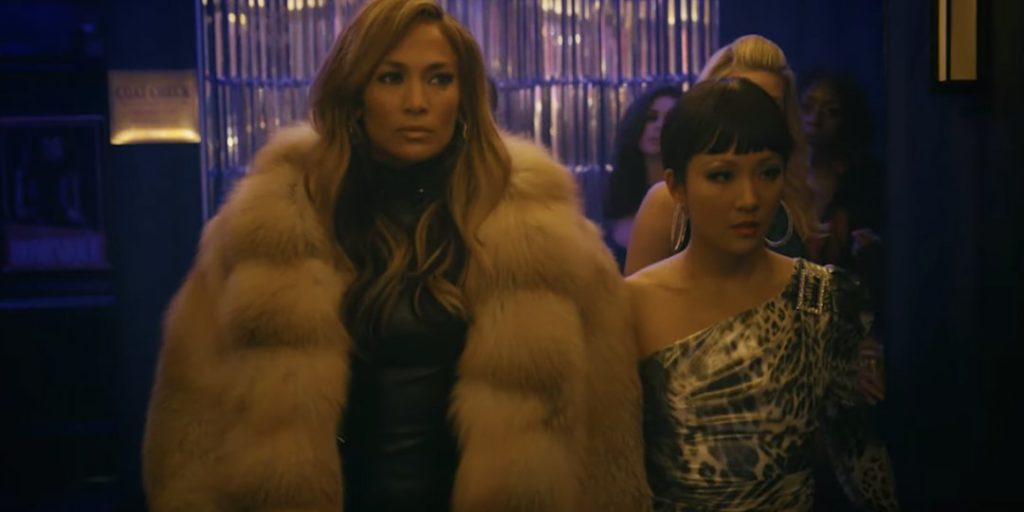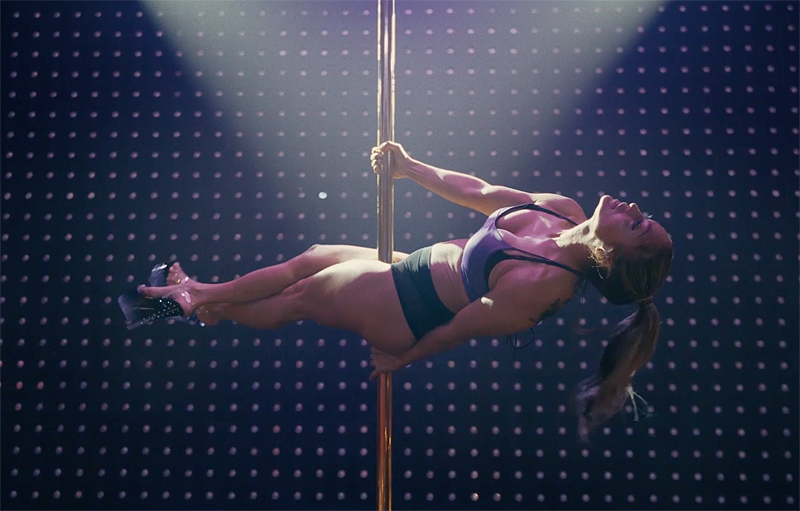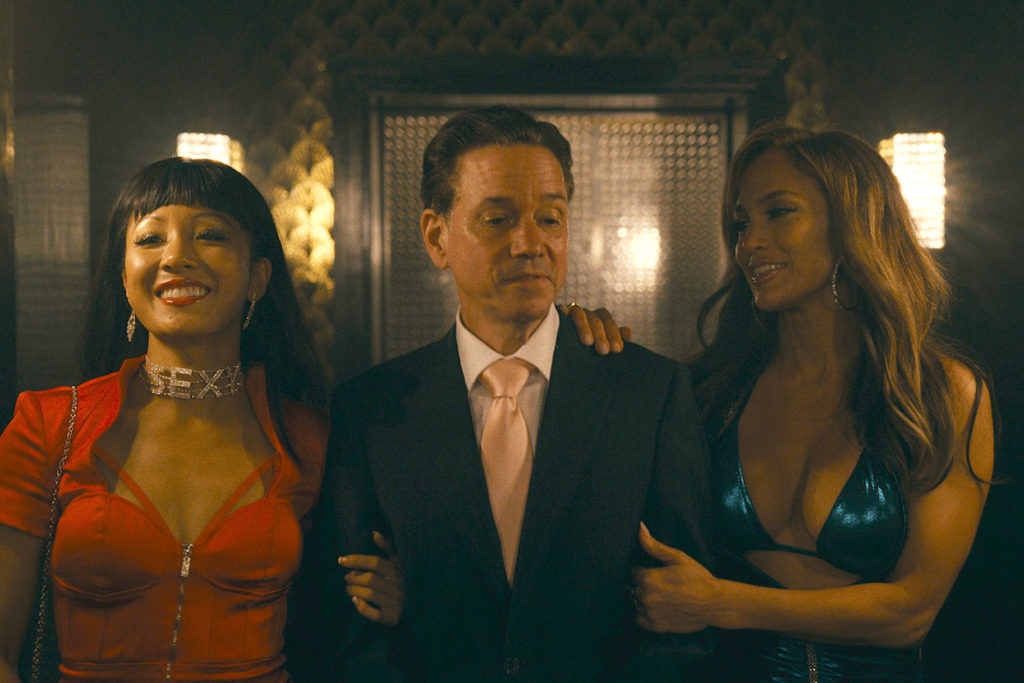
In the midst of issuing a pep talk to his gang of ravenous stockbrokers in The Wolf of Wall Street, Leonardo DiCaprio’s Jordan Belfort equates his sleazy brokerage firm with America itself. “This is the land of opportunity,” he proclaims to the phalanx of slickly dressed, amoral sycophants arrayed around him on the umpteenth floor of a Manhattan high-rise. Hustlers, the robustly entertaining new movie from Lorene Scafaria, is in some ways a distaff spin on Wolf and other Scorsese flicks, seeing how it revels in greed, glory, and excess. But it’s also something of a rejoinder, a reminder that the ever-elusive American dream—in all its triumph, danger, and venality—isn’t just reserved for rich white men, but is feverishly sought by all corners of society. Here, the predatory goons from Wolf have become the marks, and the ornamental women who festooned its various bacchanalia are now the enterprising ringleaders.
Hustlers establishes its dual intentions with its very first shot, a fluid oner that follows Destiny (Constance Wu) as she exits the dressing room at a gentlemen’s club and strolls onto the main floor, along with her comrades in armless evening wear. At first, the tone is one of boisterous enjoyment: The costumes are sexy, the music is catchy, and everyone seems to be having a good time. But when the tracking shot ends and the cutting begins—first gradually, then with greater speed—the cheerful atmosphere begins to curdle, Destiny’s plastered smile occasionally slipping into a grimace as she is (literally) manhandled or (perhaps worse) ignored by her callous clientele. By the time we see her regurgitating half her tips to managers and bouncers, Scafaria has efficiently established the work of an exotic dancer as just that, work: long, hard, and decidedly unglamorous.
In adapting Jessica Pressler’s New York Magazine article—which was titled “The Hustlers at Scores”, and which dished about a cadre of strippers who defrauded dozens of Wall Street wheeler-dealers who had loose lips and fat wallets— Scafaria has presented herself with a number of tricky challenges. She must parade her female characters—young, attractive, and scantily clad—as objects of desire without actually objectifying them. Similarly, she must make them sympathetic, even heroic—victims of a patriarchal system, they’re fighting back against entrenched sexism and gender inequality—without entirely excusing their rampant criminality.

That she mostly succeeds is due less to her screenplay, which is familiar and predictable, than to her cinematic vigor and her talented cast. Visually speaking, Hustlers is hardly revolutionary, but there’s a reason its gimmicks are so durable; the shot of three beautiful women striding toward the camera in slow motion is always satisfying, especially when set to a killer pop song. And while Scafaria hardly needed to embellish the proceedings with an ungainly framing device—the narrative periodically flashes forward to Destiny’s interview with a journalist, where she recounts the prior events with the benefit of wistful experience—the movie is briskly paced and snappily edited. There are several sharp montages of playful debauchery, and a scene where Destiny and a cohort experiment with a drug cocktail ends with a smash cut that yields one of the film’s biggest laughs.
And of course, a recognizable recipe always goes down smoother when it’s prepared with the finest ingredients, by which I mean actors. In Crazy Rich Asians, Wu had to play the starstruck straight woman who progressively revealed a steely strength; she leans on that quality throughout here, depicting Destiny—the character’s real name is Dorothy, but everyone calls her by her nom de vroom—as an intelligent, resolute woman whose resourcefulness plausibly gives way to recklessness. The supporting cast is solid, most notably Riverdale’s Lili Reinhart as a plucky collaborator with a vomit reflex. Scafaria also fills out several minor roles with sturdy character actors: Julia Stiles as the incredulous journalist, Mercedes Ruehl as a den mother, Frank Whaley as a high roller.
They’re all good. But the real reason to see Hustlers—the movie’s animating spirit, its very embodiment of glitz and smarts and sheer force of will—is Jennifer Lopez.
I’ve heard whispers anointing Lopez’s performance in Hustlers as her finest since Out of Sight; scanning her filmography over the past two decades, I find that praise to be extraordinarily faint. No matter. From the moment she appears here—we first see her character, Ramona, marching onto the stage in sequined lingerie to the beat of Fiona Apple’s “Criminal” and treating the crowd to a kinetic routine that could politely be described as invigorating—the movie acquires an elemental energy that it retains whenever Lopez is on screen. Not long after her introduction—and following a charming rooftop chat which finds Destiny being taken under this veteran’s pelt-encased wing—Ramona gives her new protégé a hands-on education in the art of stripping. (In a cameo, Cardi B. provides an assist.) Paired together, these two scenes are likely to make the rounds on certain regions of the internet, but they’re also illustrative of Lopez’s effortless grace and athleticism. She’s Magic Mike in furs and heels.

Lopez’s blazing charisma contrasts nicely with Wu’s calculating toughness, which is why Hustlers works best when it examines the two women working together. When night-club attendance craters following the 2008 recession, Destiny and Ramona concoct a bold, dangerous, brazenly illegal scheme designed to replenish their revenue stream. Collaborating with hand-picked beauties (including those played by Reinhart and Keke Palmer), they seduce wealthy men, spike their drinks with drugs engineered to both loosen their inhibitions and impair their memory, then rack up charges and cash advances on their credit cards. It’s an undeniably risky con, but its sheer improbability doubles as its defense mechanism; after all, what rich man is going to tell his friends and family, much less the police, that he got scammed by a bunch of strippers?
In chronicling the inevitable ups and downs of its women’s thievery, Hustlers is easily engaging, but it also operates as a textbook study of entrepreneurship. Destiny and Ramona develop a business plan, build a client base, hire and fire employees, promulgate workplace rules, and create an incentive structure dripping with big-ticket bonuses. It’s tempting to draw an equivalence between these self-reliant women and their well-heeled victims, who presumably made their millions through amoral behavior and financial malfeasance. In a sense, Destiny and Ramona have responded to the demands of the free market and created a commercial competitor, where the industry is the swindle.
Certainly, Scafaria’s loyalties lie with the women. This is understandable, but it also places the film on ethically shaky ground; Hustlers’ vibrant enthusiasm could be misread as outright endorsement of conduct which, in the harsh light of day, looks an awful lot like larceny and assault. And while the final act introduces a sympathetic score (Steven Boyer, who naturally had a bit part in The Wolf of Wall Street) intended to represent the human cost of the main characters’ misdeeds, it doesn’t entirely nullify Scafaria’s sense of approval.

Then again, does it really need to? It feels a bit like gender bias to admire Scorsese’s oeuvre and countless other male-centric crime pictures, which are littered with horrific crimes far worse than any witnessed here, while simultaneously raising an eyebrow at the exploits (and exploitations) of these proudly autonomous women. This movie is bracing, buoyant, and fun; those aren’t traits that typically require an apology.
Besides, the emotional resonance in Hustlers lies not so much in its customary themes—empowerment, self-improvement, hubris, etc.—but in its portrait of feminine friendship. Like the rest of us, Destiny is in awe of Ramona, but she’s also a little scared of her. As the film progresses, the pair develop an intimacy that’s more interesting for being less than absolute; they love each other, but they don’t always agree with or trust one another. It’s here where Lopez’s performance, as dynamic and alluring as it may be, is also beautifully nuanced; she shows how much Ramona cares about her family, even if she’s also selfish and ruthless.
As a whole, Hustlers isn’t quite as complex. It follows an obvious blueprint, and it doesn’t supply many surprises. But its conventionality does little to diminish its pleasure, which is further amplified by a killer soundtrack. The men whom Destiny and Ramona steal from have all sorts of flaws, but perhaps their greatest sin—the quality that makes them vulnerable in the first place—is their embarrassment. As this movie proves, sometimes there’s no shame in being taken for a ride.
Grade: B
Jeremy Beck is the editor-in-chief of MovieManifesto. He watches more movies and television than he probably should.
